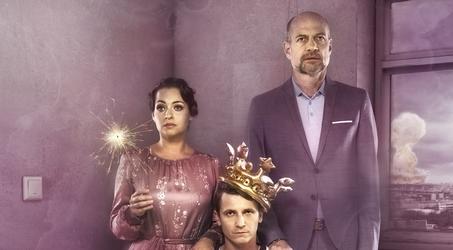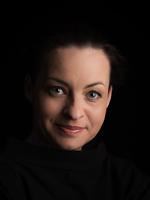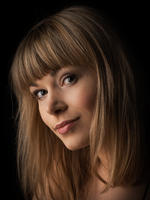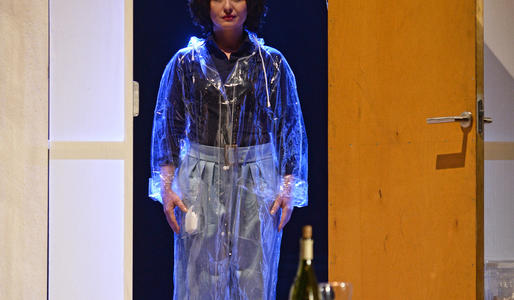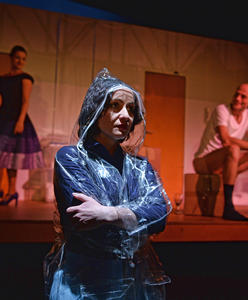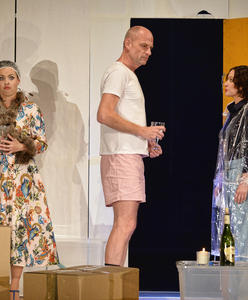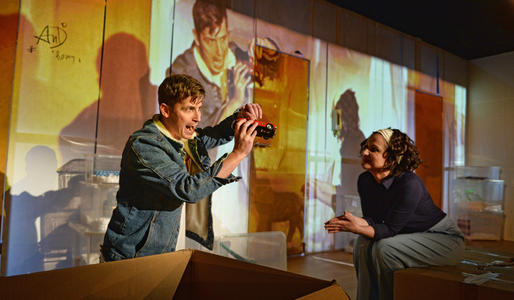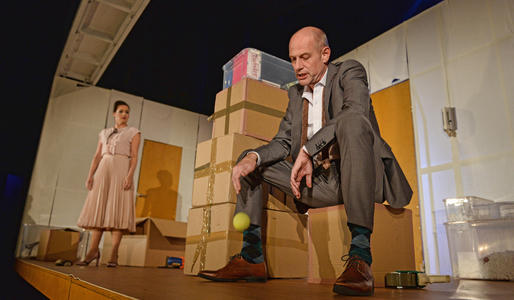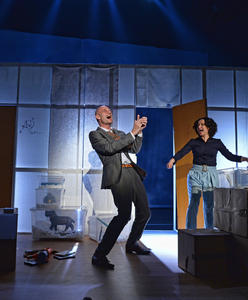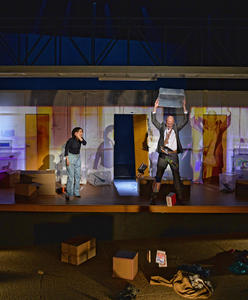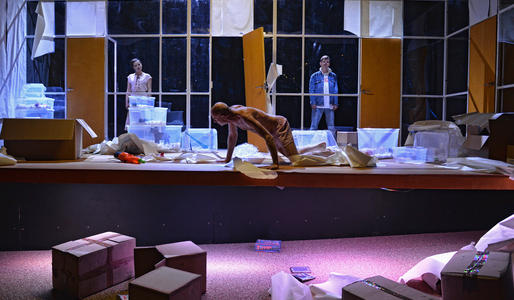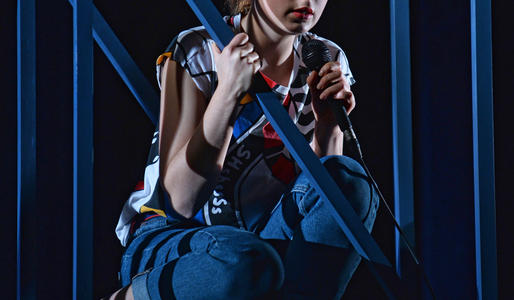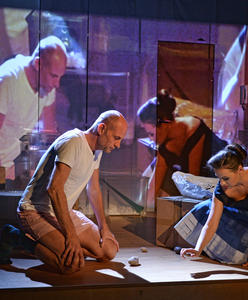WHEN PROMISES FROM THE PAST CATCH UP WITH US
Lukáš Dubský 27. November 2017 zdroj www.i-divadlo.cz
(…) The Woman Before is built like a classic conversation drama but with black comedy elements and references to the ancient myth of Medea. (…) The basic plot looks like a topic for a crazy situation comedy – Frank and Klaudie are moving somewhere overseas after 19 years of marriage and their son Andi is also getting ready to depart together with them.
On the last night in their old house, who should appear at the door but Romy – Frank´s lover from long time ago, a woman he hasn´t seen for 24 years. This gulf of time doesn´t prevent her from confidently announcing that Frank should leave his family in order to be with her, as he once promised that he would love her forever. Understandably, Frank´s wife Klaudie doesn´t have time for this kind of melodrama. (…) Frank, played by Igor Ondříček, represents one of the central themes of the play. Completely unexpectedly, he gets the opportunity to turn the life he’s been living upside down. He can erase almost 20 years and start again, if he just leaves with Romy. His relationship with his wife has obviously gone cold already, and moving overseas was intended to have spiced up their life together a bit. But now Frank has to choose between freedom, which would mean negating his life up to now, and responsibility. His scope for decision making is actually rather limited, as it isn´t Frank that’s in control of what´s happening. Even though the core of the dispute is about him, and the object of his affection, it becomes an arena for two female rivals. On the one side, there is Klaudie, a settled woman that Radka Coufalová portrays as a fastidious lady who isn´t used to playing second fiddle. At the same time, her love for her husband has not completely died, and she nostalgically keeps a plastic bag from Paris as a memory that they had once seen better times together. The second female element is the mysterious Romy, played by Markéta Sedláčková, whose assertive pronouncement of totally absurd demands forces her adversary to define her position sharply. Sedláčková utters her character’s requirements without excitement, as if she were just mentioning them in passing. It seems like Romy doesn´t realize the radical nature of her proposals, so convinced is she that she has the right to make them. This love triangle is complemented by their son Andi (Vojtěch Blahuta), who resembles his father in many ways - for example when he claims to have promised that he would love his girlfriend forever but then forgets what he said only a few hours later. Andi´s girlfriend Tina (Eliška Skálová) is the narrator of the story, describing it from the position of a partially uninvolved person. Her monologues provide an almost voyeuristic view through a window into a family home. (…)
THE WOMAN BEFORE – A BLEAK DRAMA WITH A HINT OF HORROR
Kateřina Šebelová 20. November 2017 zdroj www.epochtimes.cz
A fatal tragicomedy with elements of horror and the grotesque: that seems a good summary of the latest production from Brno City Theatre’s repertoire - The Woman Before. (…) It starts off with a well-timed dramatic situation that not only opens the door to the flat but also looks into the souls of every family member, all of whom have to face the unexpected questions and situations that suddenly come to the surface due to Romy´s presence. The set is appropriate to chamber drama, being reminiscent of a half-empty flat and a corridor in which the majority of the story takes place. The walls are covered in paper and there are boxes everywhere waiting for the occupants to move house. This space, with its depersonalization, works effectively with the emotions of the audience. The part of the stage where the central monologue or dialogue takes place is always lit. The rest of it, with the things that are less important at a given time, is left in darkness. (… ) The central trio of roles are played by Igor Ondříček (Frank), Radka Coufalová (Klaudie) and Markéta Sedláčková (Romy). The other characters in the story are Vojtěch Blahuta (the couple’s son, Andi) and Eliška Skálová (both the Narrator and Tina). Igor Ondříček as Frank, who finds himself in an unpleasant situation when the past ruthlessly opens his door, played the role of a man torn by indecision very well. He simply cannot decide how to deal with his tricky situation correctly and face reality. His sense of duty tells him to stay with his family and cut himself off from his past forever, but the old promise he made to Romy many years ago and the associated chance of an escape from his responsibilities offers an attractive alternative. Igor Ondříček plays his schizophrenic character convincingly and with excellence. Radka Coufalová also gives a balanced performance in the role of his wife, Klaudie, managing to capture the despair of a woman who is in danger of losing her life partner in a manner that’s completely believable. Markéta Sedláčková is also very well-chosen as a femme fatale who stirs up the still waters of twenty years of marriage in order to turn it upside down. She plays the role of an unbalanced, pathological woman who finds escape in her memories and the past with excellent economy of expression. Her cold cruelty and the ruin she brings permeate the bleak ending to the whole tale. (…)
THE WOMAN BEFORE – AN INTERESTING PRODUCTION AT BRNO CITY THEATRE’S DRAMA THEATRE (…)
Jaroslav Štěpaník 15. November 2017 zdroj www.literarky.cz
(…) With his distinctive, original vision, the author offers hyperbole and an artificially prepared model situation (…) Using the symbolism of ancient tragedy, he presents disturbing questions concerning the present day, a time seeing the destruction of many certainties, and the relativisation of past values, interpersonal links and relationships. (…) Alžběta Burianová has staged the text excellently, with understanding and feeling for the author. Her collaborators also deserve praise. The stage arrangement by Pavla Kamanová purposefully reduced the available space and thus brought the action closer to spectators. The elevated ramp was an excellent solution. The light design by David Kachlíř emphasized the atmosphere and Jakub Kudláč’s music was very impressive. The director could rely on experienced, excellent actors who were well-suited to their roles and were convincing without exception. A. Burianová adapted the text together with Jan Šotkovský. The Brno City Theatre’s Drama Theatre offered a very interesting and well-conceived production of a contemporary play which probes inner relationships in an original manner. (…) It evokes questions which transcend the boundaries of the drama itself. The past isn´t something that has passed, or has passed us by in some way. It is embodied in the present and penetrates it, even though this often (luckily) doesn’t occur as unexpectedly or fatefully as in the play.
The play reminds us of certain nuances in male and female perception. It conveys the message, in brief, that children resemble their parents perhaps too much and perpetuate the past. While the stranger treats her past, her dream, her ideal and the spoken promise as if it were reality, the other woman protects that which she has lived with for many years, with all it involves. She also can refer to a promise, and in this case, one which is even confirmed by signatures at an altar or town hall. The play doesn´t remind us of this, it doesn´t deal with it, doesn´t analyse it – this is not its purpose, which is to make us ask questions. Isn´t the promise upon which the whole play is based only a mere pleasantry that doesn’t actually entail any commitment? Many words are uttered without much thought, and without considering the possibility that the listener may have perceived them in a different way. The past doesn´t go away, it remains stored in memories. Even forgotten ones which others remember. (…) The Woman Before – a play about the non-absoluteness, instability and transience of human feelings whose enemy is time itself and, to an even greater extent, the human character. (…)
THE WOMAN BEFORE COMES BACK FOR UNFULFILLED LOVE
(tr) 10. November 2017 zdroj www.brnozurnal.cz
(…) Romy Vogtländerová walks onto the stage through the main door of a flat full of packed boxes and immediately announces, calmly and with a smile, that she has come for Frank. Twenty-four years ago, he apparently promised his eternal love to her. (…) His wife is surprised, of course, and reacts as everyone else would in her place: she asks Romy to leave. At first the play reminds one of Feydeau´s farce A Flea in her Ear in which the characters keep on flying through doors. However, the topic is a serious one: the ex-lover never stops insisting, and the married couple gradually reveal moments from their relationship. They find themselves dealing with two critical moments at once – moving house, and the unexpected appearance of an ex-lover. Unexpected connections appear in relation to banal situations. (…) The wife becomes angry, furious even, and the seemingly calmer husband gets into a state where he finds himself wanting to succumb to the attractions of his ex-lover. (…) The play has a tragic end that’s resonant with a moment from Euripides´ Medea. In the tense scenes, the props fly all the way up into the wide proscenium. The play is performed without a break, on an impressive (though actually reduced-size) stage with costumes made by Pavla Kamanová. The pace of the plot is supported by inventive directorial choices as well as good music by Jakub Kudláč. (…)
THE WOMAN BEFORE COMES BACK FOR UNFULFILLED LOVE
(tr) 10. November 2017 zdroj www.brnozurnal.cz
(…) Romy Vogtländerová walks onto the stage through the main door of a flat full of packed boxes and immediately announces, calmly and with a smile, that she has come for Frank. Twenty-four years ago, he apparently promised his eternal love to her. (…) His wife is surprised, of course, and reacts as everyone else would in her place: she asks Romy to leave. At first the play reminds one of Feydeau´s farce A Flea in her Ear in which the characters keep on flying through doors. However, the topic is a serious one: the ex-lover never stops insisting, and the married couple gradually reveal moments from their relationship. They find themselves dealing with two critical moments at once – moving house, and the unexpected appearance of an ex-lover. Unexpected connections appear in relation to banal situations. (…) The wife becomes angry, furious even, and the seemingly calmer husband gets into a state where he finds himself wanting to succumb to the attractions of his ex-lover. (…) The play has a tragic end that’s resonant with a moment from Euripides´ Medea. In the tense scenes, the props fly all the way up into the wide proscenium. The play is performed without a break, on an impressive (though actually reduced-size) stage with costumes made by Pavla Kamanová. The pace of the plot is supported by inventive directorial choices as well as good music by Jakub Kudláč. (…)

